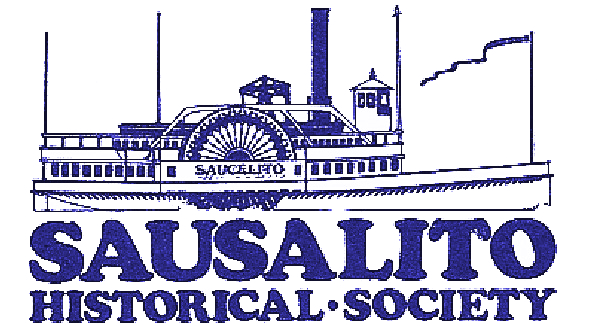This is the final installment from recollections of an unknown early Sausalitan, apparently written in the early 1960s. As in the two previous excerpts, what follows is a knowledgeable, often gossipy, sometimes inaccurate account, of people, places and events in Sausalito before and after the turn of the century.
The original San Francisco Yacht Club faced Belvedere on the coast of Hurricane Gulch. The club had to be abandoned when the Golden Gate Ferry came in because the wash from the boats made anchoring impossible and launching hazardous.
About 1884 or 1886 the Sausalito Bay Land Company, O.C. Miller, undertook a [land] boom to open up the gulch with a picnic. The wind came up, as it can on a summer afternoon, and blew the tablecloths off the tables and the cutlery and everything around. That is when the Gulch got its name — “Hurricane Gulch.” The eucalyptus grove was planted as a windbreak. The boom didn't go well.
Pen-and-ink illustration of Excelsior Lane by Leonard Sutton Wood, who died in Sausalito in 1970.
Courtesy of Sausalito Historical Society
Excelsior Lane used to be called “Limejuice Alley” because the Englishmen all came up and down the lane, a main thoroughfare before automobiles took over. They were known as Limeys, Limejuicers, because English Law required vessels to carry lime juice to prevent scurvy among sailors. The lower part of Excelsior Lane had wooden steps, but from there up to the top, until the 90's was only steep, red clay with triangular rocks sticking up.
El Monte Lane was called “Pig Alley” because at the foot was a pig sty.
There was always a Bachelor's House. One on Pine and Girard and the “Old Hutch” on Bulkley Avenue, now apartments. The bachelors always married and a new lot took their place.
When the streets were paved and gas was put in — I said to my husband “This is the end of Sausalito as we know it.” How right I was!
Telephones came to Sausalito in the early 1900's. You ground out the number you wanted on a wall phone. If you were on the same line you didn't need the operator – Central, she was called then. You ground the ball to get her and said: “Get me Fiedler's”, the grocery store; “Mecchi's”, the Italian fruit and grocery store and Oh, such good, good things did they have to eat, or Mrs. Mason or Mrs. Corson. Central knew everybody, without their numbers, and probably listened in.
Fred Russell, tall, handsome, with big dark eyes and puffy fingertips was Cashier of what [became] is now the Canadian Bank of Commerce for many, many years. He had four wives. The last one surviving him, a charming French woman, Miss Melville. John McNamara, who worked in people's garden, said when Mr. Russell married for the fourth time, “I should think the women would be scared of him — He's got the Red Liver.” I later found out that the Red Liver [Gout?] was authentic Elizabethan. I think it was Wully Corson who said, “Fred Russell is the kind of man who should have a wife in the drawing room and a ...wench in the woodshed.” Mr. Russell was the only man in Sausalito who still paid dinner calls forty years ago. He was always punctilious, well bred, courteous. His children were by his first wife who was a sister of Mrs. Mason's. Florry Philpotts wrathfully followed him and the girl he was wooing about the streets of San Rafael. But in spite of that he outlived three wives.
Gossip about Sausalito, as we first knew it, would not have been complete without mention of the Corsons. A delightful couple. He, a black-eyed Edinburgh man with a lovely accent, and she a New Zealander with the most complete knowledge of everybody else's business that she passed on discreetly without venom. The Ideal Gossip. If there was anything to know about...Mrs. Corson Knew It. They were hospitable, kind, and their house, “Red Gables,” [is] still in 1962 standing and occupied, with tennis courts, an aviary, was the Headquarters for much British Sociability. The Billiard Room on the ground floor was used for dancing. Somebody had to play piano. No records, no radio in those days. We had the Steam Cars and the Telegraph and the Ferry-boats and didn't miss what we didn't have.
Telephones were new.

